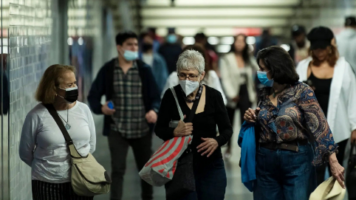COVID-19 News
COVID-19 Update | March 10, 2023
March 10, 2023

COVID-19 Update | March 10, 2023
The California Biotechnology Foundation is committed to keeping you up to date about COVID-19 testing, treatment and prevention advancements. The following resources track what progress has been made as of March 10, 2023. Notable advancements include:
-
- Results from a clinical trial indicated that patients with COVID-19 who were treated with the diabetes drug metformin for two weeks after a diagnosis were less likely to develop symptoms of long COVID-19.
- Nasal administration of a monoclonal antibody treatment was found to decrease lung inflammation and dampen inflammatory T cell response in patients with COVID-19.
- Researchers found that healthcare workers who experienced symptoms after receiving a COVID-19 vaccination had longer and stronger immunity than those who did not.
Recent News
- Diabetes drug proves beneficial in preventing long COVID-19 in clinical trials
The Hill – March 8, 2023
COVID-19 patients who took the diabetes drug metformin for two weeks after a diagnosis were less likely to develop long COVID-19 symptoms, according to results from a clinical trial. The trial enrolled about a thousand participants who were symptomatic with a COVID-19 infection for less than a week. Participants were randomly selected to receive a placebo or one of three drugs: metformin, ivermectin or fluvoxamine. About 6 percent of people who took metformin later developed long COVID-19, as determined by a medical diagnosis. In the placebo group, 10.6 percent of participants developed long COVID-19. This meant that overall people who took metformin were 42 percent less likely to develop long COVID-19 compared to people who got the placebo. - First nasal monoclonal antibody treatment for COVID-19 shows promise for treating virus, other diseases
Medical Press – March 8, 2023
A pilot trial by investigators from Brigham and Women’s Hospital, a founding member of the Mass General Brigham health care system, tested the nasal administration of the drug Foralumab, an anti-CD3 monoclonal antibody. Investigators found evidence that the drug dampened the inflammatory T cell response and decreased lung inflammation in patients with COVID-19. Further analysis showed the same gene expression modulation in patients with multiple sclerosis, who experienced decreased brain inflammation, suggesting that Foralumab could be used to treat other diseases. Their results are published in the Proceedings of the National Academy of Sciences. - Can Early Outpatient Treatment Reduce the Risk of Long COVID-19?
Contagion Live – March 8, 2023
COVID-19 monoclonal antibodies (mAbs), intravenous remdesivir, and oral antivirals, including Paxlovid (nirmatrelvir/ritonavir) and molnupiravir, have been used for early COVID-19 treatment in individuals at high risk of severe disease progression. However, there is little known about the effect of early therapies on post-COVID-19 conditions, or “long COVID.” A new study, presented during a poster session at the recent 30th Conference on Retroviruses and Opportunistic Infections (CROI 2023), compared the efficacy of these therapies in reducing COVID-19 hospitalization and death. The investigators also studied whether early outpatient COVID-19 therapy reduced long COVID symptoms after 3 months. The investigators concluded that early implementation of COVID-19 therapies can reduce the risk of COVID-19 symptoms after 3 months. - Seasonal trends in COVID-19 cases, hospitalizations, and mortality in the United States and Europe
Nature – March 8, 2023
Determining whether SARS-CoV-2 exhibits seasonality like other respiratory viruses is critical for public health planning. We evaluated whether COVID-19 rates follow a seasonal pattern using time series models. We used time series decomposition to extract the annual seasonal component of COVID-19 case, hospitalization, and mortality rates from March 2020 through December 2022 for the United States and Europe. Models were adjusted for a country-specific stringency index to account for confounding by various interventions. Whether certain high-risk individuals may need more than one COVID-19 vaccine booster dose each year will depend on factors like vaccine durability against severe illness and levels of year-round disease activity. - Why COVID-19 deaths among vaccinated show that boosters matter
American Medical Association – March 7, 2023
Since COVID-19 vaccines became widely available in the spring of 2021, there has been a wide gap in deaths between the unvaccinated and vaccinated. Toward the end of 2022, though, data showed that most deaths from COVID-19 were among those who are vaccinated. But that doesn’t mean COVID-19 vaccines and boosters are ineffective. It’s quite the opposite. The bivalent COVID-19 vaccine booster—which was first recommended last fall—protected against infection and death during the circulation of BA.4 and BA.5 Omicron subvariants. In fact, people who received the updated COVID-19 bivalent booster were 14 times less likely to die compared with those who received no vaccine. They were also three times less likely to die compared with those who received only the primary series of COVID-19 vaccines, according to a report from the Centers for Disease Control and Prevention. - COVID-19 vaccine side effects linked to better long-term outcomes: Study
Becker’s Hospital Review – March 6, 2023
Healthcare workers who had symptoms after receiving a COVID-19 vaccination had longer and stronger immunity than those who did not, researchers at Farmington, Conn.-based UConn Health, found. The study, published in Vaccines, looked at data from 296 UConn Health workers, including 46 who already had COVID-19. Participants were vaccinated with either the Pfizer or the Moderna mRNA vaccine. Researchers studied their blood for neutralizing antibodies at two months, five months and nine months post-vaccination. Participants who had symptoms following the vaccination such as fever, aches or a sore arm had a stronger and longer lasting neutralizing antibody response. The response outperformed both those who had COVID-19 before the vaccine and those who had not, according to the study - Screening Protocols During Early Phase of COVID-19 Improved Outcomes in MM
American Journal of Managed Care – March 6, 2023
New study findings of patients with multiple myeloma (MM) in the early phase of the COVID-19 pandemic underscore the importance of continuing MM treatment and focusing on controlling disease burden for improved outcomes instead of delaying treatment. The group found no relationship between prior lines of treatment, type of treatment, active treatment, or maintenance treatment and severity or outcomes associated with COVID-19 infection. The researchers added, “This finding reinforced the notion of safely continuing the MM therapies during the COVID-19 pandemic in patients without evidence of COVID-19 infection, with focusing on better control of MM disease burden for better overall outcomes rather than delaying the therapies for MM.” - Antibody levels from prime COVID-19 mRNA vaccine influences the efficacy of booster doses
News Medical Life Sciences – March 6, 2023
In a recent study published in Cell Reports, researchers evaluate the response of pre-existing immunity to booster doses of messenger ribonucleic acid (mRNA) COVID-19 disease 2019 vaccine. The researchers also investigate whether the effectiveness of the updated vaccine was better than that of the ancestral vaccine. Overall, the results indicated that pre-existing immunity from prime doses reduced the efficacy of booster doses of the mRNA vaccine. This suggests that longer intervals between prime and booster mRNA doses were advantageous, as it would allow antibody levels to decline. Similar longer intervals between convalescent plasma therapy and booster doses were also recommended. - California to end mask, vaccine mandates for health care worker
The San Francisco Chronicle – March 3, 2023
California will drop COVID-19 mask and vaccination mandates for health care settings next month, according to updated guidance released Friday by the state’s health department. Beginning April 3, health care workers, patients and visitors will no longer be required to wear a mask or be vaccinated to work in facilities that include hospitals, urgent care centers and dental and doctors’ offices. The new rules also apply to correctional facilities as well as homeless, emergency and warming and cooling centers, said the California Department of Public Health.
Rely on California Biotechnology Foundation to monitor breaking news and provide updates on the latest advancements in COVID-19 diagnostics, vaccines and treatments.
Stay informed on the latest news and trends on the economic and health benefits of this industry by visiting the new CABiotech.org
If you have any questions about hosting informational briefings for your colleagues serving in the legislature, contact California Biotechnology Foundation Executive Director Patty Cooper at (916)764-2434 or [email protected].


